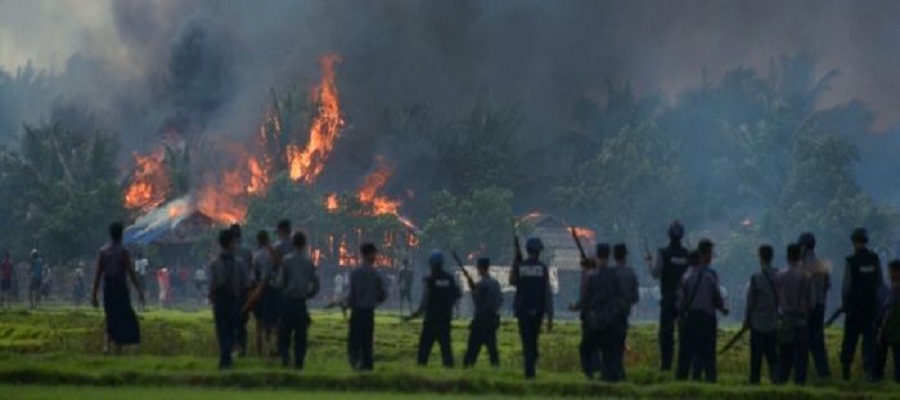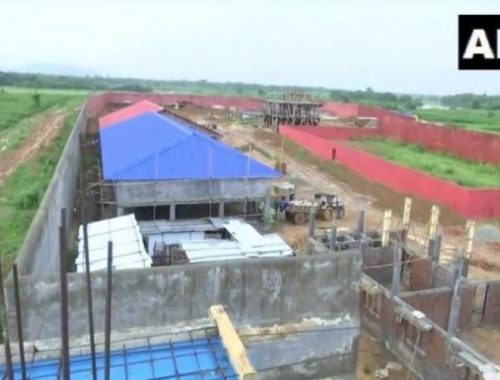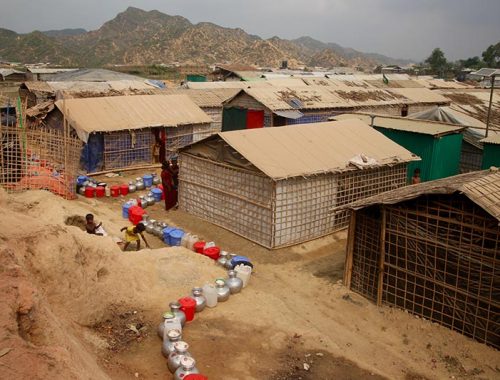On January 23, the International Court of Justice (ICJ) passed an order in the case of Gambia against Myanmar about the treatment of the Rohingya in Myanmar. The UN and other international bodies have said that Myanmar conducted genocide against Rohingyas. India has been in denial. The Narendra Modi government wants the Rohingya to be pushed back to their country of origin. Rohingya refugees fleeing what the world now recognises as genocidal conditions in Myanman have not been permitted to enter the country and have been denied appropriate human and humane conditions of work. This was brought to the attention of the Supreme Court in vivid terms, with the Union of India still in denial. Under the Indian constitution, persons (not just citizens) are entitled to equality, life and liberty and due process.
Around 740,000 Rohingyas fled to Bangladesh following the crackdown of 2017. This does not count the refugees who fled to other countries and the many who were massacred in Myanmar before and after the crackdown.
Last November, the tiny West African nation of Gambia had the courage to file a case against Myanmar over the treatment of Rohingyas in the ICJ at The Hague in General List No.178 entitled: Request for the indication of provisional measures. At issue was the ‘Convention on the Prevention and Punishment of Genocide”.

Gambia’s Justice Minister Abubacarr Tambadou talks to the media outside the ICJ. Photo: Reuters/Eva Plevier
Myanmar was given notice and heard. Gambia’s team had eight persons making the case. Myanmar had four, led by State Counsellor Aung Sang San Suu Kyi. It may be recalled that in December 2019, she appeared before the ICJ to say no genocide had occurred and that measures had been taken to protect the Rohingya. After discussing the legal authorities on genocide, the court concluded (para 76-82) that Myanmar was bound by the Genocide Convention and made the following directions which need to be quoted from the order:
76. From all of the above considerations, the Court concludes that the conditions required by its Statute for it to indicate provisional measures are met. It is therefore necessary, pending its final decision, for the Court to indicate certain measures in order to protect the rights claimed by The Gambia, as identified above (see paragraph 56).
77. The Court recalls that it has the power, under its Statute, when a request for provisional measures has been made, to indicate measures that are, in whole or in part, other than those requested. Article 75, paragraph 2, of the Rules of Court specifically refers to this power of the Court. The Court has already exercised this power in the past (see, for example, Alleged Violations of the 1955 Treaty of Amity, Economic Relations, and Consular Rights (Islamic Republic of Iran v. United States of America), Provisional Measures, Order of 3 October 2018, I.C.J. Reports 2018 (II), pg.651, para.96).
78. In the present case, having considered the terms of the provisional measures requested by The Gambia and the circumstances of the case, the Court finds that the measures to be indicated need not be identical to those requested.
79. Bearing in mind Myanmar’s duty to comply with its obligations under the Genocide Convention, the Court considers that, with regard to the situation described above, Myanmar must, in accordance with its obligations under the Convention, in relation to the members of the Rohingya group in its territory, take all measures within its power to prevent the commission of all acts within the scope of Article II of the Convention, in particular: (a) killing members of the group; (b) causing serious bodily or mental harm to the members of the group; (c) deliberately inflicting on the group conditions of life calculated to bring about its physical destruction in whole or in part; and (d) imposing measures intended to prevent births within the group.
80. Myanmar must also, in relation to the members of the Rohingya group in its territory, ensure that its military, as well as any irregular armed units which may be directed or supported by it and any organizations and persons which may be subject to its control, direction or influence, do not commit acts of genocide, or of conspiracy to commit genocide, of direct and public incitement to commit genocide, of attempt to commit genocide, or of complicity in genocide.
81. The Court is also of the view that Myanmar must take effective measures to prevent the destruction and ensure the preservation of any evidence related to allegations of acts within the scope of Article II of the Genocide Convention.
82. Regarding the provisional measure requested by The Gambia that each Party shall provide a report to the Court on all measures taken to give effect to its Order, the Court recalls that it has the power, reflected in Article 78 of the Rules of Court, to request the parties to provide information on any matter connected with the implementation of any provisional measures it has indicated. In view of the specific provisional measures it has decided to indicate, the Court considers that Myanmar must submit a report to the Court on all measures taken to give effect to – 24- this Order within four months, as from the date of this Order, and thereafter every six months, until a final decision on the case is rendered by the Court. Every report so provided shall then be communicated to The Gambia which shall be given the opportunity to submit to the Court its comments thereon.
The ICJ also observed that it could take further provisional measures.
As an authoritative pronouncement, it is both symbolic and law. That said, I am uneasy on three counts. First, it throws the Rohingya back into the lions’ den and tell the lions not to be hungry. Second, it asks Myanmar to take measures to stop this genocide. It is easy for Myanmar to enact policies and law. It will tout this as compliance. Third, they are expected to report back in four months and thereafter every six months.
Every commentator seems to say that the ICJ cannot enforce its decisions but Myanmar’s vulnerability may persuade the country to do so. My fear is that they will report and fill it with lies, deceits and untruths or twisted truths. Where will we go from there? I think a UN Special Rapporteur on Genocide should monitor this genocide, past or future, and also human rights organisations.
Explainer: The International Court of Justice’s Rulings Are Final but Not Enforceable
Whatever its limitations, the ICJ’s provisional measures are a victory for humanity. Will what the world court has said have an impact on India and on the debate over India’s Citizenship (Amendment) Act (CAA?I think it does.
Firstly, India is bound by the ICJ’s decision. Recall that the decision was unanimous and confirmed by all judges, including India’s Justice Dalveer Bhandari. Of course, Justice Bhandari cannot act on Narendra Modi or Amit Shah’s instructions. But his concurrence in this case is important.
Second, if we look at the CAA, we will notice the target beneficiary countries of the Act do not include Myanmar. The Rohingyas are Muslims and the double whammy is that Muslims are excluded from the CAA, even from Bangladesh, where many have sought refuge.

Protest against the CAA and NRC in Mumbai on Sunday. Photo: PTI
What is India’s stance in relation to the Rohingya? In fact, they cannot be repatriated to their country of origin (Myanmar) or their transit country (Bangladesh). Bangladesh does not want them back. One of the backbones of the CAA is to confront persecution. Here is a clear case of persecution in a near neighbouring country, which, till 1937, was administratively part of India. There cannot be a hiatus between India’s new law on persecution – the CAA – and its own internationally binding obligation under many composite human rights instruments. Even though it has not signed the Refugee Convention, it sits on the executive committee of the United Nations High Commissioner of Refugees and Indian courts have mandated that some refugees have a right to process their status.
by Rajeeb Dhavan, The WIRE




